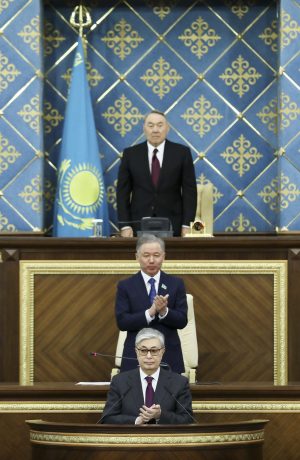In the aftermath of Qandy Qantar, “Bloody January,” as the violent suppression of popular protests became known in Kazakhstan, several members of the old elite lost power and seemingly disappeared into the background. One of these is former speaker of the lower chamber Nurlan Nigmatulin, a once powerful bureaucrat now ousted from decision-making circles.
Nigmatulin was removed from his post as speaker of the parliament on February 1, just weeks after the state of emergency was lifted and people across Kazakhstan resumed their lives. In his place, President Kassym-Jomart Tokayev nominated Yerlan Koshanov, a seasoned bureaucrat deemed closer to the new elite.
At the time, Tokayev also reshuffled the political council of the Amanat ruling party (then still under the old moniker, Nur-Otan), dropping Dariga Nazarbayeva, the eldest daughter of former President Nursultan Nazarbayev; Bauyrzhan Baibek, ex-mayor of Almaty; and ex-Prime Minister Askar Mamin, alongside Nigmatulin.
The ousted were closely-linked to Nazarbayev, giving the impression of a “purge” among the ranks of the government and the political elite.
Nigmatulin and other politicians were mentioned in a speech at the U.K. Parliament in February, as Labor member Margaret Hodge proposed that a long list of powerful figures close to Nazarbayev be put under sanctions for corruption and human rights violations.
“In Britain, we turned a blind eye, ignored the corruption and helped the Kazakh regime launder and spend its dirty money. […] Nurlan Nigmatulin, Baurzhan Baibek and Marat Beketayev are senior figures in the ruling Nur-Otan party and are close associates of Nazarbayev. They are embedded in supporting corruption and allegedly responsible for human rights abuses,” Hodge said.
Several names listed by Hodge faced prosecution in Kazakhstan in the following weeks and months, including Nigmatulin’s brother.
Yerlan Nigmatulin, Nurlan’s twin brother, established himself as an influential businessman in Kazakhstan, with interests in metals, gold mining, and crypto-mining.
On August 11, Kazakhstani media reported that the twins were being investigated for a criminal corporate raid against Kuat Sultanbekov, a businessman from the Karaganda region, the stronghold of the Nigmatulin family.
Over the summer, Yerlan also appeared in the press for the foreclosure of some of his crypto-mining businesses, which were deemed “gray” activity – that is unregistered data centers mining cryptocurrency via company electricity systems. Between March and August, dozens of gray crypto-mining operations were shut down by the authorities, leading to several arrests.
In July, Kazakhstan’s Supreme Court acquitted Seitkazy Matayev and his son Aset, of KazTAG news agency and Kazakhstan’s Journalist Union, overturning a 2016 sentence that found them guilty of embezzlement and tax evasion. Both Seitkazy and Aset were released early with an amnesty.
In 2016, at his last hearing, Seitkazy Matayev accused Nigmatulin of trying to illegally seize his media outlets with the complacency of the courts.
Nigmatulin responded that the accusation was “pure fiction.”
“The statement, in my opinion, is just an attempt to politicize the trial,” Nigmatulin told the press.
Before the January events, Nurlan Nigmatulin was one of the protagonists of the higher echelons of power in Kazakhstan.
In April, Almaty-based political analyst Viktor Kovtunovskii said Nigmatulin could be the only viable successor to Tokayev in the minds of those who orchestrated the alleged coup in January.
“The speaker of the Majilis and the head of the parliamentary faction of the Nur-Otan party, Nurlan Nigmatulin, showed no obvious signs of disloyalty to the Nazarbayev clan. Thus, the putschists did not really have much choice. It was Nigmatulin who was to become the third president of Kazakhstan,” Kovtunovskii wrote in a Facebook post.
Whether Kovtunovskii’s explanation for Qandy Qantar is accurate and his speculation about Nigmatulin’s role in the imagined post-Tokayev Kazakhstan is realistic, it remains clear that the progressive marginalization of the former speaker is a sign of a diminishing influence.
The court cases that the Nigmatulins have faced in recent months hint at a potential fall from grace of a once-powerful family.
































